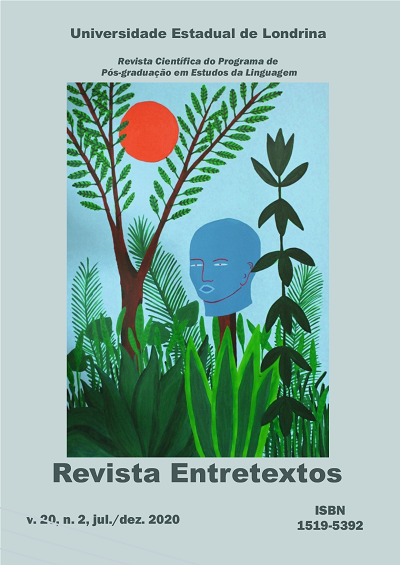Orality in Portuguese language teaching: a diagnosis of the problem considering the National Curricular Common Basis
DOI:
https://doi.org/10.5433/1519-5392.2020v20n2p59Keywords:
Orality, Oral discursive genres, SeminarAbstract
In this article, we present part of a research developed as an initial diagnosis about competences and abilities in the performance of formal oral discursive genres of eighth grade students in a public school in a municipality in the lower south of Bahia, development of a Professional Master in Language Teaching, conducted by one of the authors of this article. The purpose of this part of the research work was to analyze the skills related to the oral discursive genre seminar, from transcriptions of the presentations, as examples, made by the teacher-researcher. The analysis of the data allowed to conclude that five of the eleven contents related to the seminar were not identified in the presentations of the students, only three of them were demonstrated by the students in their entirety and the other three only partially. From the questioning, raised at first, we have the following statement: there are characteristics / contents that only some students can demonstrate, about the discursive genre seminar, due to its more frequent practice. Therefore, the contents of oral discursive genres, their structure, modes of functioning and linguistic and textual characteristics need to be formally taught, to be carried out consistently and consciously.Downloads
References
ARAÚJO, Denise Lino de; SILVA, Williany Miranda da. Oralidade em foco: conceitos, descrição e experiências de ensino. Campinas: Pontes, 2016.
BRASIL. Base nacional comum curricular (BNCC): educação é a base. Brasíla, DF: MEC /CONSED/UNDIME, 2017.
BRASIL. Secretaria de Educação Fundamental. Parâmetros curriculares nacionais: língua portuguesa. Brasília: SEF, 1997.
BUENO, Luzia; COSTA-HÃœBES, Terezina da Conceição (org.). Gêneros orais no ensino. Campinas: Mercado de Letras, 2015.
LEAL, T. F.; GOIS, S. (org.). A oralidade na escola: a investigação do trabalho docente como foco de reflexão. Belo Horizonte: Autêntica, 2012.
MARCUSCHI, Luíz Antônio. Da fala para a escrita: atividades de retextualização. 10. ed. São Paulo: Cortez, 2010.
ONG, Walter. Oralidade e cultura escrita. Campinas: Papirus, 1998.
SCHNEUWLY, Bernard; DOLZ, Joaquim. Gêneros orais e escritos na escola. 3. ed. São Paulo: Mercado de Letras, 2011.
SILVA, Cinara Sousa da. Conteúdos da oralidade: uma proposta de intervenção pedagógica com o gênero discursivo seminário escolar. 2019. 223 f. Dissertação (Mestrado Profissional em Letras) - Departamento de Ciências Humanas, Universidade do Estado da Bahia, Santo Antônio de Jesus, 2019.
ZUMTHOR, Paul. A letra e a voz: a literatura medieval. São Paulo: Companhia das Letras, 1993.
Downloads
Published
How to Cite
Issue
Section
License
Copyright (c) 2020 Entretextos

This work is licensed under a Creative Commons Attribution 4.0 International License.
Entretextos adota a Licença Creative Commons Attribution 4.0 International, portanto, os direitos autorais relativos aos artigos publicados são do/s autor/es.
Sob essa licença é possível: Compartilhar - copiar e redistribuir o material em qualquer suporte ou formato. Adaptar - remixar, transformar, e criar a partir do material, atribuindo o devido crédito e prover um link para a licença e indicar se mudanças foram feitas.























